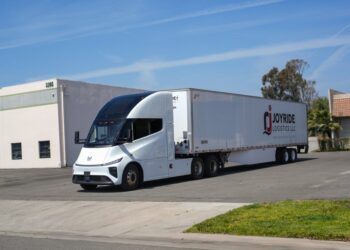Daimler Truck financial services originations fall 16%
Daimler Truck North America unit sales fall 20% YoY
German commercial vehicle manufacturer Daimler Truck felt the effects of tariffs and tariff-related economic uncertainty in the second quarter, resulting in lower financial services originations and outstandings as global and North American truck sales fell.
While Daimer Truck Financial Services saw revenue growth in Q2 because of higher product margins, lower sales, high cost of risk due to the North American freight recession and currency exchange rates hurt the company’s performance, Daimler CFO Eva Scherer said during the company’s earnings call today.
Daimler Truck North America sales fell 20% year over year in Q2, while orders fell 53% in the quarter as uncertainty limits the entire North American truck market, Daimler CEO Karin Radstrom said during the earnings call.
“This reflects the current market environment in North America, where customers lack the certainty they need to make investment decisions. This doesn’t just affect Daimler Track; it affects the entire industry.” — Daimler CEO Karin Radstrom
With tariff negotiations still ongoing, Daimler expects the North American truck market to continue to face uncertainty due to tariffs and investigations into section 232 steel and aluminum tariffs, Scherer added.
Daimler Truck has lowered its full-year heavy-duty truck unit sales forecast for North America to between 250,000 and 280,000 units, lower compared with initial guidance of between 260,000 and 290,000, while maintaining its other 2025 segment guidance metrics, Scherer said.
Still, increased order activity in July did lead to some optimism for Daimler Trucks North America (DTNA).
“Assuming this positive trend continues, we now expect 135,000 to 155,000 units for Trucks North America,” Scherer said. “Because of lower unit sales, we now expect full year profitability to land between 10 and 12%.”
BY THE NUMBERS
Daimler Truck Group’s performance declined in Q2, as Daimler Truck North America’s negative quarter dragged the group’s performance:
- Group revenue declined 5.8% YoY to 11.8 billion euros ($13.6 billion);
- Financial services revenue rose 2.9% YoY to $986.3 million;
- Originations, or new business volume, fell 15.5% to $2.9 billion;
- Total outstandings, or contract volume, declined 7.7% YoY to $34.3 billion;
- Loss allowance grew 6% YoY to $693.8 million;
- Leasing and sales financing business share fell 1.1 percentage points to 42.7% of total assets;
- DTNA units sold dropped 20% YoY to 38,580 units;
- DTNA incoming orders plummeted 53.2% YoY to 13,842 units;
- DTNA production declined 22.8% to 38,635 units;
- Group truck units sold fell 4.9% YoY to 106,715 units;
- Group incoming orders declined 4.9% YoY to 88,241 units;
- Group production dipped 1.6% to 109,847 units;
- Daimler Truck’s global zero-emission vehicles (ZEV) sales spiked to 1,232 units, up 90.1% YoY; and
- Daimler Truck’s global ZEV orders plummeted to 807 units, down 60.3% YoY.
Market outlook
In the third quarter, Daimler Truck expects North American truck volumes to decline about 20% from Q2, with profitability falling below the lower end of its revised full-year margin range, Scherer said. Meanwhile, Mercedes-Benz Trucks is projected to see a 15% to 20% sales increase over Q2, with improved profitability. Trucks Asia and Daimler Buses are expected to maintain stable sales and earnings and Financial Services is forecast to return to Q1 levels.
Despite an expected decline in truck volume, Daimler continues to focus on managing its dealer inventory as it competes for market share, Scherer said.
“We’re seeing that our share of market for heavy duty currently remains stable around 40% to 41% as our dealer inventory for class eight is about proportionate to the market, but we’re also seeing decreasing market share in the medium duty segment,” she said. “There’s also more pricing pressure going on there, and we do expect dealer inventory to reduce from current levels, and that results then in higher retail sales.”
It is uncertainty rather than concerns over the tariffs themselves, that is making it difficult for the truck industry to forecast freight volumes. This, in turn, complicates investment planning, CEO Radstrom said.
Daimler customers, she said, “look more generally on the economy, what’s happening to the interest rates, inflation, industrial production, consumption, rather than looking at one particular tariff from one particular country.”
Shares of Daimler Truck Holding AG [OTCMKTS: DTRUY] were trading at $22.60 at market close today, down 0.92% from market open. Daimler has a market capitalization of $37.45 billion.
Editor’s note: All amounts have been converted to U.S. dollars.
Check out our exclusive industry data here.









